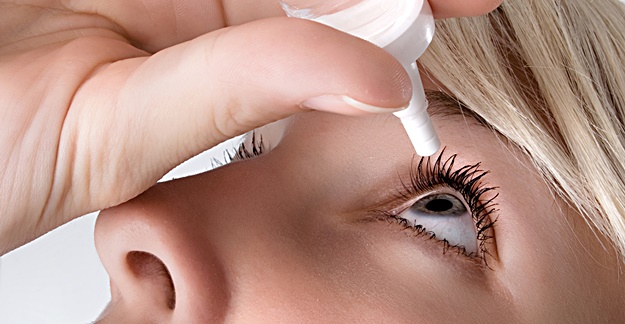In June, police announced surprising charges in a nearly three-year-old murder case: the victim’s friend had poisoned her with eye drops. This is far from the first time the seemingly innocuous over-the-counter (OTC) medication Visine and its ilk have been used to inflict harm. In 2020, a woman was sentenced to 25 years in jail after using the same toxin to kill her husband. And the stories go back, too. A 2013 article in Wired starts by rattling off a series of criminal cases involving the liquid sold in a tiny bottle that can be poisonous, if used the wrong way.
How Visine Works
The drops the killers used in these scenarios are designed to transform red, bloodshot eyes into clear, whiter eyes by reducing the size of the blood vessels that inhabit them. Visine Original Red Eye Drops, which is a decongestant, constricts your blood vessels. As the blood vessels tighten, there’s more white and less red in your eyes, but if the drug is ingested, its active ingredient, the chemical tetrahydrozoline, can shrink blood vessels throughout your body, causing shortness of breath, seizures, coma, and even death.
Causes of Irritated Eyes
Dilated blood vessels aren’t the only cause of irritated eyes. For that reason, some doctors worry that the OTC drops used by many of their patients can do more harm than good.
“Ask any eye doctor. Visine is the most hated eye drop used by patients,” says Dagny Zhu, an ophthalmologist and cornea, cataract and refractive surgeon, at Hyperspeed LASIK | NVISION Eye Centers in Rowland Heights, Calif. “The problem is that a red eye can often be a sign of a dangerous underlying condition, like an infection or inflammatory disease. Using Visine only masks the problem. And delayed treatment can lead to vision loss.”
You may have red, itchy or dry eyes for many different reasons, including:
Allergies
Dry air
Infection
Smoke
Lack of sleep
Crying
Dehydration
Marijuana use
Glaucoma
Too much screen time
Eye irritation can also be a side effect of the following drugs:
Antidepressants
Antihistamines
Decongestants
Blood pressure medications
Acne medication Accutane
In many cases, you may be able to treat irritated eyes with a little extra sleep or by closing them and resting cool cucumber slices or refrigerated spoons on top of them for a few minutes. Applying these items can gently cool and soothe your eyes, reducing redness and swelling. Avoid using heavy items or applying pressure, which can increase irritation. You can also use a humidifier to moisturize eyes.
Not all eye drops – even OTCs, available without a prescription – are created equal. Some target redness and dryness, while others contain compounds that treat allergies or bacterial infections.
Artificial Tears
Artificial tears supplement the natural lubrication your eyes produce. The American Academy of Ophthalmologists suggests trying these products to reduce redness before you consider a decongestant like Visine Dry Eye Tired Eye Lubricant Eye Drops, or Bion Tears Eye Drops. If they help, but you find yourself using them regularly, switch to a “preservative-free” solution, like Bausch & Lomb Soothe Long Lasting (Preservative Free) Eye Drops, because over time, preservatives can irritate your eyes.
Decongestants
Drugs like Visine Original Red Eye Drops or Clear Eyes Redness Relief constrict the blood vessels to reduce redness. For that reason, you shouldn’t use them for more than 72 hours. Doctors warn that if you apply the drops continuously, you may experience a “rebound effect” of worsening redness and itch when you stop the treatment. If you have glaucoma, which damages the optic nerve and disrupts vision, these drops can also cause acute angle-closure glaucoma, a condition that may lead to severe headaches, blurred vision and pain. If you experience these symptoms, seek emergency care right away.
Antihistamines
Some drops, such as Pataday products and Zyrtec Itchy Eye Drops, contain antihistamines, a type of drug used to treat eye irritation – especially itching — triggered by allergies. Some decongestant eye drops also contain antihistamines.
Antibacterial
You need a prescription for antibacterial drops, if you have an infection like pink eye, also called conjunctivitis.
Pressure-Relieving Drops
These drops are another prescription-only option used to reduce pressure in the eye caused by glaucoma.
Side Effects of Eye Drops
If you use eye drops as directed, in limited amounts and only in your eyes, they are unlikely to result in dire consequences, like shortness of breath, seizures, coma, and even death. They can, however, lead to myriad side effects and mask issues that require medical treatment.
While only the decongestant drops will constrict your blood vessels and cause the famously poisonous reaction if injected, any eye drops can cause “blurry vision, dilated pupils, watery eyes or mild burning and stinging,” says Chris Airey MD, a physician with Optimale and the National Health Service (NHS).
Like many drugs, eye drops can trigger allergic reactions, such as swelling, rashes, dizziness and difficulty breathing. If you experience any of these symptoms, seek emergency care immediately.






